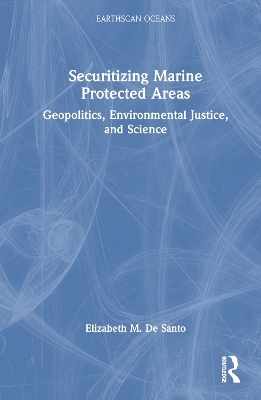
Securitizing Marine Protected Areas
Routledge (Verlag)
978-1-032-04097-4 (ISBN)
This book presents a novel examination of Marine Protected Areas within a security context, bridging science, policy, and geopolitics, and addressing the often-under-emphasized aspect of environmental justice.
The book argues that Marine Protected Areas (MPAs) are not only a critical tool for protecting marine biodiversity in a changing climate, but they also play an important role at the intersection of geopolitics and environmental justice, and they provide a case study of environmental governance at the science-policy interface. The book takes an interdisciplinary and critical approach and builds on the author's two decades of experience working in this field. Geopolitically, it explores the ways in which MPAs provide footprints for influence and access to resources far from home for nations with overseas territories. MPAs also raise important issues connected to equity, environmental justice, and social justice, including access to resources and participation in environmental decision-making processes, key aspects for achieving long-term conservation goals. The book also demonstrates how MPAs are a critical lens for understanding how policy makers cope with scientific uncertainty, and the necessity of well-designed and precautionary science advisory processes. While the ecological contribution of MPAs is paramount, social issues and geopolitical considerations are often less obvious in the discourse underpinning MPAs, and the resulting tensions can undermine long-term conservation objectives. By applying the three lenses of geopolitics, environmental justice and science, this book provides key insights to help the international community moving past the 2030 biodiversity targets and beyond, towards a future of meaningful, equitable, and effective conservation approaches.
This book will be of great interest to students and scholars of biodiversity conservation, marine studies, political geography, environmental governance, and science-policy studies. It will also be of interest to marine conservation governance professionals and policymakers.
Elizabeth M. De Santo is Associate Professor of Environmental Studies in the Department of Earth and Environment at Franklin & Marshall College, USA. She has held positions with Dalhousie University, the International Union for Conservation of Nature (IUCN) and the World Environment Center. She is a member of the IUCN World Commission on Environmental Law and the editorial board of Marine Policy. She holds a PhD in Geography from University College London, UK.
1. Introduction Part I: Geopolitics 2. Militarized legacies and future positioning: MPAs in the context of US-China tensions in the Indo-Pacific 3. Spheres of influence and securing resources: geopolitical advantages of MPAs in British and French overseas territories Part II: Environmental Justice 4. Exclusionary heritage of Empire: the Chagos MPA in the British Indian Ocean Territory 5. MPA planning amid the pillars of procedural environmental justice Part III: Science 6. Managing uncertainty and implementing precaution: MPAs at the science-policy interface 7. Charting a course for science in rough seas 8. Conclusion
| Erscheinungsdatum | 10.07.2024 |
|---|---|
| Reihe/Serie | Earthscan Oceans |
| Zusatzinfo | 22 Tables, black and white; 3 Line drawings, black and white; 20 Halftones, black and white; 23 Illustrations, black and white |
| Verlagsort | London |
| Sprache | englisch |
| Maße | 156 x 234 mm |
| Gewicht | 453 g |
| Themenwelt | Naturwissenschaften ► Geowissenschaften ► Hydrologie / Ozeanografie |
| Weitere Fachgebiete ► Land- / Forstwirtschaft / Fischerei | |
| ISBN-10 | 1-032-04097-1 / 1032040971 |
| ISBN-13 | 978-1-032-04097-4 / 9781032040974 |
| Zustand | Neuware |
| Haben Sie eine Frage zum Produkt? |
aus dem Bereich


